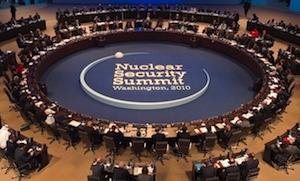Assessing Progress One Year After the Nuclear Security Summit
Featured Image
Today's top nuclear policy stories, events, and analysis with excerpts in bullet form.
Stories we're following today - Tuesday, April 12, 2011:
Nuclear Security Summit: 1 Year Anniversary - Kingston Reif and Duyeon Kim for The Center for Arms Control and Nonpoliferation [link]
- One year ago, President Barack Obama hosted a historic Nuclear Security Summit in Washington, DC aimed at preventing nuclear terrorism. The Summit proved to be a success in that it raised international awareness at the highest level on the need for global cooperation to prevent nuclear materials from falling into terrorist hands.
- According to a joint report released today by the Arms Control Association and the Partnership for Global Security, roughly 60 percent of the national commitments made in Washington have been completed. For example, since the Summit, Serbia and Chile have given up their highly enriched uranium. Kazakhstan secured enough highly enriched uranium and weapons-grade plutonium to make 775 nuclear weapons.
- The future of global nuclear security poses both challenges and opportunities. The next Summit set for 2012 in the Republic of Korea will be an important opportunity to ensure full implementation of the Washington Summit agreements and to go beyond them.
Japan Moves to Secure Damaged Plant - Mitsuru Obe, George Nishiyama, and Toko Sekiguchi in The Wall Street Journal [link]
- Japanese officials are increasing their focus on protecting the troubled Fukushima Daiichi nuclear power complex from strong earthquake and tsunamis, after problems following two strong aftershocks over the past week showed officials are unprepared for another major incident.
- The new focus comes as the Nuclear and Industrial Safety Agency said Tuesday it raised its assessment of the month-long crisis at the plant to the highest severity level by international standards, putting it at the same level as the 1986 Chernobyl disaster.
- Most of the radiation releases from Fukushima Daiichi occurred in the first few days of the crisis. Since then, the cumulative amounts have remained largely unchanged, according to data from the safety commission.
GRANTEE TWEET: “@DavidCulpDC Congress adopts higher Senate Dem. number for nuclear nonproliferation program in final CR. Increase of $190 mil. (+9)." Click here for the details of the bill.
Iran Touts Major Advances in Nuclear Program - Joby Warrick in The Washington Post [link]
- Iran is proclaiming significant gains in its nuclear program, progress that Western officials and experts say could effectively erase setbacks from recent cyber attacks and shorten the timeline for acquiring nuclear weapons.
- Scientists from Iran’s atomic energy program, in announcements over the past three days, said they have successfully tested advanced centrifuges for enriching uranium and are less than a month away from starting the country’s first commercial nuclear reactor.
- Although U.S. officials have long suspected that Iran is capable of making better centrifuges, Iranian scientists have struggled to obtain the kinds of specialized materials needed to build them.
GRANTEE ANALYSIS: “Strategically Lonely” Iran Exploits Opportunities for Regional Influence - Barabara Slavin of The Atlantic Council [link]
- Over the past three decades, the Islamic Republic of Iran has shown remarkable endurance. It has survived an eight-year war with Iraq, mounting economic sanctions, and serious domestic unrest.
- Turkic sea. Not a member of any significant defense alliance, Iran has gained strategic depth from the U.S. overthrow of rival Sunni regimes in Iraq and Afghanistan, and has accomplished a key goal in ensuring that Iraq will not pose a military threat to Iran for the foreseeable future.
- Endemic and growing fractiousness within the Iranian government and a history of hedging have undermined Iranian strategic goals. Pro-democracy trends in the Arab world are boomeranging back to Iran, reigniting in 2011 domestic dissent, which was brutally suppressed after the disputed presidential elections in 2009.
- There are three main goals: to help stabilize the region in a sustainable way; to allow U.S. forces to be drawn down from Afghanistan to more modest levels, within the 2014 timetable agreed to by NATO; and to encourage Iran to be less confrontational toward the United States and its allies.
- In the interest of Iran’s neighbors in particular, it is important to try to lay the groundwork for regional coopera- tion. This could provide a basis for better relations in anticipation that the long enmity between the U.S. and Iran will eventually end.
How Close Did the United States Come to Launching a War against Iran? - Christopher Preble for The National Interest [link]
- As early as 2005, Israel determined that it could not deliver a knockout blow against Iran’s nuclear facilities, Ha’aretz reported over the weekend.
- Given the Iranian government’s wide dispersal of facilities around the country, including near population centers, and their skill in concealing sites from foreign intelligence services, even the most optimistic estimates anticipated that air strikes would only set back the Iranian program by a few years, time that would allow the country’s religious leaders—and President Mahmoud Ahmadinejad’s thugs—to consolidate their hold on power.
- A bombing campaign by either Israel or the United States would rally the Iranian people to support an otherwise unpopular and incompetent regime, as even targeted strikes would have resulted in a large number of civilian casualties. It is for these reasons, among others, that Iranian pro-democracy advocates and regime opponents have consistently argued against a U.S. or Israeli military attack on Iran.
EVENT: Hearing on the Missile Defense Agency budget - April 13, 2:30 pm [link]
- Senate Armed Services Subcommittee on Strategic Forces
- Witnesses: Bradley Roberts, Deputy Assistant Defense Secretary for Nuclear and Missile Defense Policy; Lt. Gen. Patrick O'Reilly, Director, Missile Defense Agency; Rear Adm. Archer Macy, Director, Joint Integrated Air and Missile Defense Organization, The Joint Staff; Cristina Chaplain, Government Accountability Office
- 232-A Russell Senate Office Building, Washington
- Video webcast on the committee website



